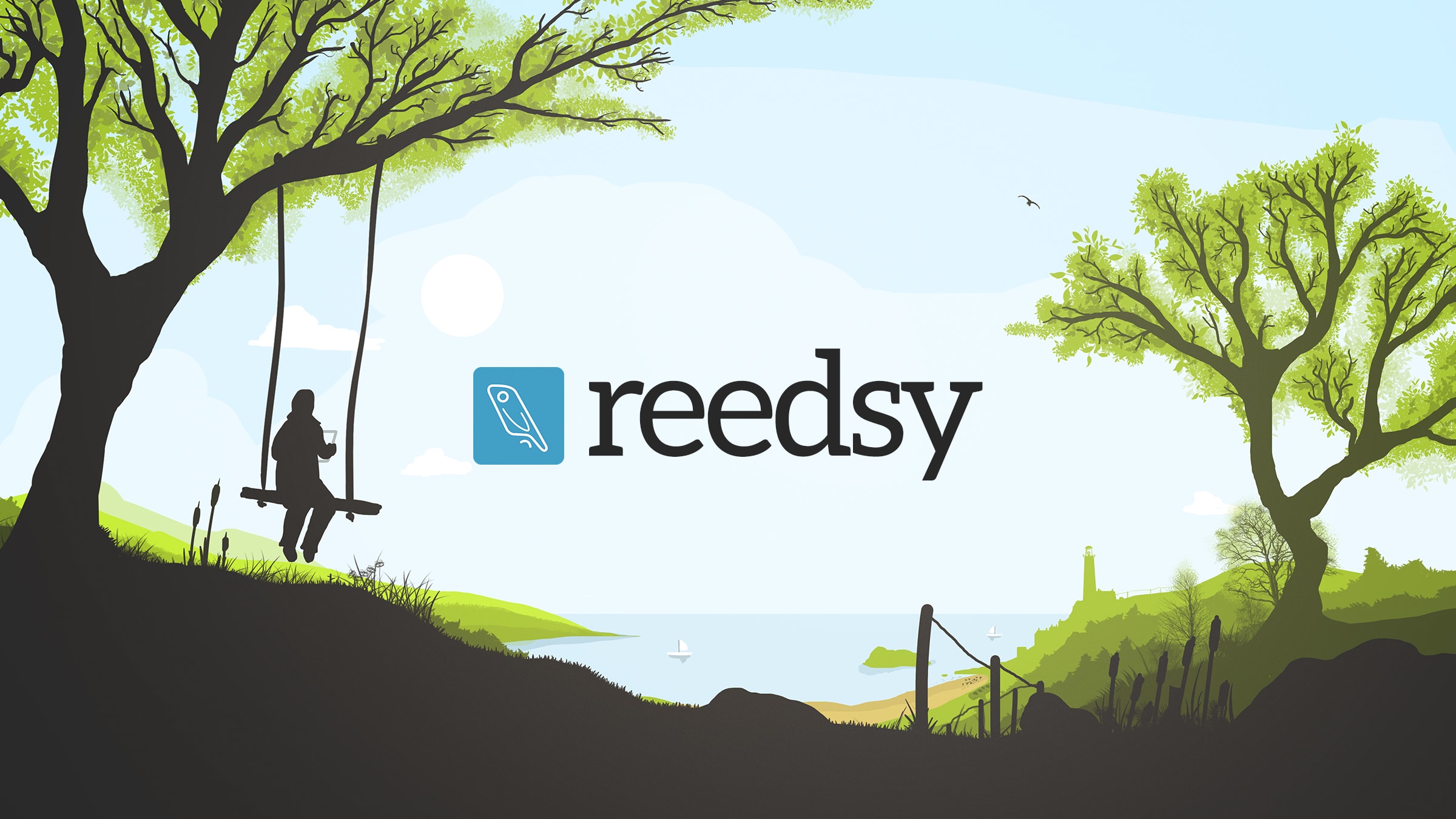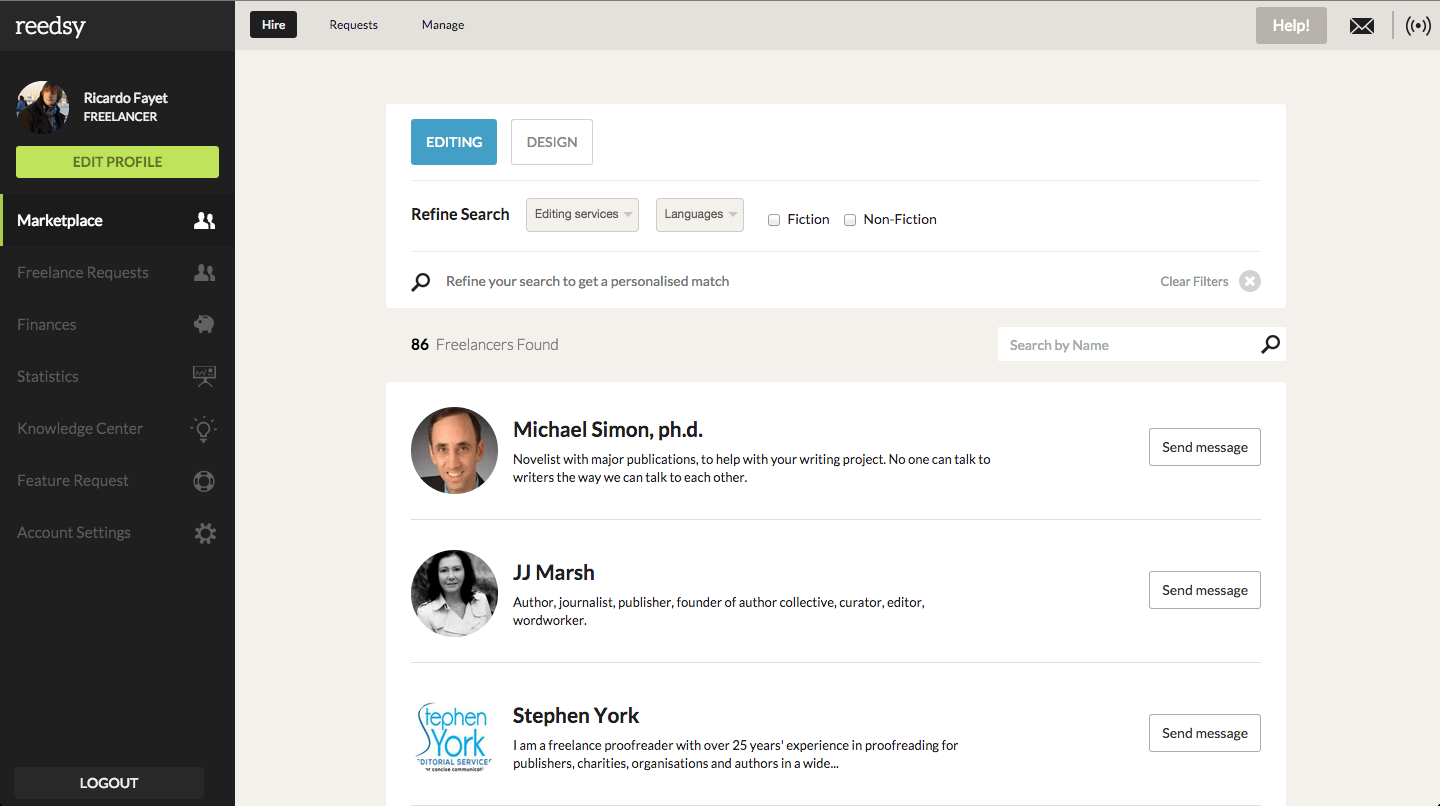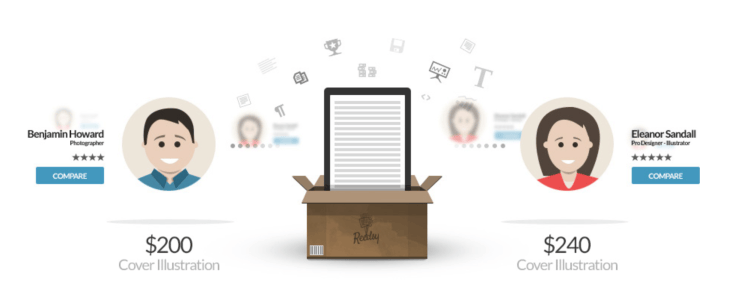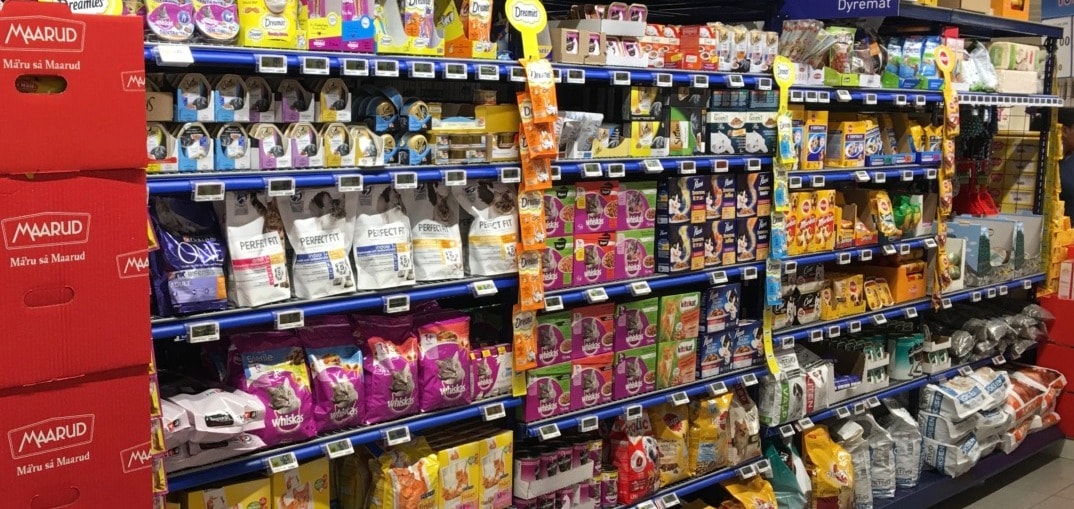Startup for the Brave New Age of Digital Publishing
Reedsy is a startup aimed at the publishing industry. At the Women’s Fiction Festival, a writers’ conference held in Matera, Italy, I met Ricardo Fayet, Reedsy’s Chief Operating Officer and had a chance to chat with him. The website is still in beta version, here is the landing page: www.reedsy.com.
Note the lovely design with soft colors, attractive and friendly. You can open an account as a writer or as a “freelancer” or both. A freelancer is someone providing services as copy or development editor, book cover designer, illustrator etc. Even though this is still in beta version, the list is already quite long, over 100 names, and most are obviously affirmed, experienced professionals. One can filter by genre, which is very useful for a writer looking for help to finalize a particular book in a particular genre. Considering Reedsy is still in a beta phase, this is a remarkable achievement. Of course there are still some bugs and that’s normal, it’s early day. For example, the feature to enable writers to look for more specific professional help is not yet activated, but it soon will be.
…………………………………………………………………………………………………………………. More: OIL SPILLS: A DOUBLE-STANDARD WORLD article by Hannah Fisher-Lauder WFP – FROM SMALL TO GIANT STEPS article by Claude Forthomme ………………………………………………………………………………………………………………….Question: Richard, I just joined your site and navigated it a bit. In a few words, can you tell us what Reedsy is about, what is its role in publishing?
Answer: Reedsy is the future’s publishing house. We support independent authors in publishing their own work. We want those authors to earn a living wage from their books. We want to help them publish their best work by connecting them with the best freelancers in the publishing industry, and by giving them the best tools to work with. And, one day, we want to do this all over the world.
Q: So you are aiming directly at supporting self-publishing that, according to some professionals in the industry, will soon become a larger market than traditional publishing. One famous UK literary agent even foresaw that in five years 75% of all books would be self-published. Why is something like Reedsy needed?
You wouldn’t have needed a service like Reedsy ten years ago when there were just a handful of publishers – editors and designers looking for work knew where to go. Now, in a post-Kindle world, we want to make sure the best freelancers are aware of all the independent authors who want to work with them, and that those authors know which freelancers they want to work with and which ones they want to avoid.
Q: What system do you use to filter the quality of freelancers? Can anyone offer their services or do they need to “prove” their experience and know-how?
A: One of the biggest ‘value-adds’ of Reedsy is that we create a tightly curated marketplace, a trusted platform where authors know that whoever they contract with is going to do a good job. I’m not saying we’ll never have complaints, as editing and designing is something very subjective, but in that case we’ll act as a mediator and identify where the fault relies.
In terms of how we do it… Well we could say it’s like Coke’s secret formula, but it’s really easy: we ask for their portfolio, check the books on Amazon and Goodreads, ask for certifications and professional associations’ membership (SfEP, EFA, EAC, etc.) and check them, same for potential awards or previous experience with a major publisher. We’re manual – that’s where the curation element comes from, the involvement of real people.
Some marketplaces have tried to get around this with a ratings system – rather than verify people personally, they’ll just wait for a client to have a bad experience and leave a bad review or down vote the freelancer. However, it doesn’t seem all that great if the only way for your marketplace to work efficiently is for some of your customers to have bad experiences – we want to avoid that if we can!
Obviously, we’ll integrate a rating system soon, where the author will have to leave a feedback after transacting and working with a freelancer. But that’s on top of our own manual vetting, which comes in the first place. We feel that this is the only way anyone can guarantee the quality of their marketplace.
Q: I agree with you, that sounds like the best way to go about it. But why call your startup “Reedsy”? Where does the name come from?
A: We came up with it like any startup comes up with a name for themselves – via a lot of arguing and throwing around ideas until something clicked. It’s got a bit of wordplay in there – Reed / Read, obviously. Also, how reeds were instrumental towards the invention of papyrus… which is a famous early example of paper… which is what books are printed on… It’s a nice sound too I think.
We then built the logo around the whole reeds and papyrus idea, by taking the Egyptian hieroglyph for “writing” (a reed) and turning it into… a parrot! Makes sense, right?
Q: It certainly makes sense and I love the Egyptian papyrus reference. How did you get the idea? Have you been working in the publishing industry as an editor or designer or are you a writer yourself?
A: Actually, none of us have a professional background in the industry. We all just love reading. Emmanuel and I bought some of the first tablets shipped to France in order to read on them. We started thinking about what this digital disruption meant for authors, and ended up coming up with Reedsy as a way of raising the standards in digital and self-publishing.
Q: Yes, I noticed you have a team of 4 people, Emmanuel, Vincent, Matthew and Tony. What type of business experience do they have? How do you work together and where?
A: We all come from different backgrounds. Emmanuel and I met at business school in France. Matt just graduated with a degree in Architecture from Nottingham here in the UK. Vincent is basically the back-end development equivalent of Yoda, working from Paris. Tony, our front-end guy, works from Surrey.
We have also added Dave very early to our team, our publishing expert and content marketing guru. He’s helping me answer these questions in refined English right now.
Q: And he’s doing very well! Hey, you have no women on your team, why not?
A: It’s a concern, but we’re aware of it and working on it. We’re actually looking for new front-end developers right now, and we want to actively encourage any women who know their stuff to apply. Here’s our post on Angel List. (https://angel.co/reedsy/jobs/33976-senior-angularjs-developer-at-reedsy)
Q: How did you get started, any financing to set up the platform or did you five guys do it on your own?
A: We first started over a year ago by simply scouting the industry and talking to authors, editors, publishers, etc. We sought validation on our idea, and got it from almost everyone. We started building a demo with which we approached some investors. We applied to Seedcamp (#1 accelerator in Europe) in May and they immediately believed in Reedsy. But the story gets better: we were in touch with the venture arm of DC Thomson, a major Scottish publisher around that time too, and they decided to co-invest alongside Seedcamp. They’ve made it possible for us to release this first version of our marketplace only 3 months after getting funded.
Q: What is your business model? I noticed that in your terms of service you say, and I quote “Reedsy shall be entitled to 10% of all payments made through the Platform (plus any applicable fees stated on our website)”. How does that work and what kind of additional fees do you envision?
A: That is right, our business model is to take a cut on transactions happening in the marketplace. We don’t see it as a “finder’s fee” but as a reward for the different collaboration tools and project management software we’re developing. The fee will be 10% of the transaction. However, as we will be using Stripe as a secure payment method, they will take 2.9% of the transaction too. No worries, though – we have a good deal with Stripe that enables us to use them for free for some time, so their fee will only kick in later!
Q: Obviously authors who have created an account on your site contact the professional freelancers through your own messaging system and that is how you monitor what happens (and get the fee). Aren’t you afraid that once the first contact is made, you lose your authors for any future work? In other words, how profitable do you expect your startup to be? When will the break-even point occur, how many authors do you need to attract to your platform for this to happen?
A: The messaging is just a start. We had so many great freelancers who created a profile that we wanted to reward them by opening the marketplace as early as possible, and a simple messaging button was all it took.
We don’t monitor messages so right now using Reedsy is 100% free: we only want to start taking fees once we offer some value in the collaboration, and that’s what Reedsy is really about.
We are currently developing a wonderful set of collaboration and project management tools that are going to make all our authors’, editors’ and designers’ lives easier. We’ve already tested them with some, and they are so enthusiastic that they actually want to bring all their clients to Reedsy once we launch that. There’s the answer to customer retention – we’re worth it because we add value to our customers’ lives.
About breaking-even, we’re not thinking about that, as it basically depends on how much we keep investing… We have exciting tools in mind to change the way authors write, collaborate and publish. We don’t want to be sustainable, we want to continue growing and making it easy for all these people to work together.
Q: One of the biggest problems for self-published authors is marketing. Book promotion can be a real headache and sucks up time away from writing. How do you see Reedsy helping independent authors in this respect?
A: I’d like to politely disagree with your first sentence. One of the biggest problems for self-published authors is that they think their biggest problem is marketing… Or “discoverability”. The same thing happens to many startups that are not doing well, “marketing” is immediately singled out as underperforming.
We have created Reedsy to solve the discoverability issue… but not through “discoverability”. Through quality. Reaching readers is not just about finding them, it’s about presenting the book when it’s in the best shape possible. The best marketing strategy has always been and will always be word-of-mouth, be it verbal or digital. If you put a book out there that your early readers will fall in love with, then you’ve done 90% of the work. The 10% left are getting the metadata right (so these early readers actually find your book) and/or reaching out to potential beta readers. And you don’t need help for that.
So yes, Reedsy is going to feature some book marketing experts at some point. Some will be publicists (but specialized in working with indie authors), some will be social media experts. Some will be consultants. They are coming later for a simple reason: how do you “certify” a publicist or a “marketer”? You need to talk directly to them, ask for a lot of testimonials, etc. It’s going to take some time.
And again, our philosophy is that they will be there to “support” the author’s sales, not to drive them. Only the books themselves can do that, through their cover, their story, their blurb, their metadata, etc.
Finally, we’ll regularly be putting self-publishing, discoverability and marketing advice on our blog. We feel many authors can do it themselves but they still need some guidance and we’re in a good position to give it.
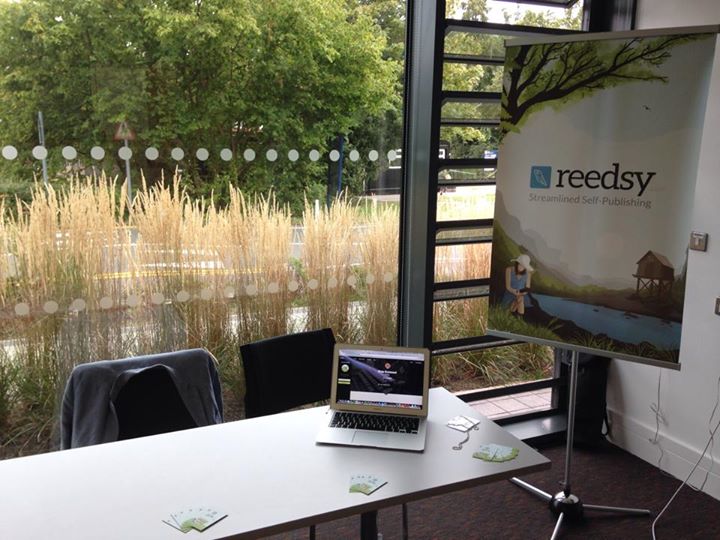
Q: Sounds good but I’ll stick by my first sentence! Let me turn to another question, do you have any rivals in the industry? Who are you competing against and why is Reedsy better?
A: There aren’t really any direct rivals to Reedsy – that we know of at least! There are marketplaces, but they’re either not as specialized within publishing, or don’t offer much of a guarantee in the way of quality. More importantly, no one has anything like our ambition.
Let’s put it this way. Right now, if you’re an author and you want to go to one place to find an amazing editor, and an amazing designer, and publicist, and translator, and narrator… where amazing doesn’t just mean ‘knows how to fill out a sign-up form,’ but means experience, means testimonials, means qualifications, means being a professional… There’s nothing like that out there.
When it comes to self-publishing, raising the quality of the finished book is just about the most important thing you can do, and it’s a total nightmare for anyone to do it right now. The situation is, for want of a less extreme word, insane. Not as insane as, for example, the glacial reaction times of the major publishers to the rise of self-publishing and eBooks. But still – pretty insane.
Why are we better? Because we don’t just want to paper over the problems in publishing that require a larger restructuring. We’re not just solving a problem for independent authors – we want to remove any distinction between books published by a traditional publishing house and by an indie. That’s the end-point.
Q: How do you plan to expand your market? Any advertising? What is your marketing strategy?
A: A natural part of our growth is expanding within a market, as well as moving into new ones. For now we’re sticking to English-language editors and designers. We’re looking into other professionals authors might want to work with – translators and publicists are the obvious choices. There’s potential to build similar networks of professionals in any country books are sold – German and Spanish are both large markets, for example…
Q: What are your hopes, your vision for Reedsy? Do you see this business as having high growth potential or do you expect to need additional support from investors?
A: We know Reedsy has a fantastic growth potential and to unlock it we are going to need additional support from investors. The publishing industry is not one where you can “stand still” with a well-performing product because right now it is ever-changing. We will need money to grow and are backed by investors who have the resources to keep supporting us through our different rounds of fundraising.
Q: What are your biggest interests and what would you like to get more into? Any charity you follow, philanthropic activities?
A: I’ve always been of the opinion that there is nothing better than a good game of football, be it playing or watching. It’s hard to mix it with publishing though, as I haven’t met many people genuinely interested in both so far, but I’ll keep looking.
Else I have a couple of friends who have started their own charities or philanthropic associations, and they are the ones I like to follow and support the most. I’d love to get more time to help them out.
Q: I know you are a Frenchman and live in England and Reedsy’s office is in London, 69 Wilson Street. Can you tell us a little more about yourself. What’s your credo, your life vision? Where do you hang out, what do you like to do to relax and cool down, do you play a music instrument?
A: Emmanuel (co-founder) and I moved to London a few months ago because we don’t have a viable market in France (nor is the startup scene particularly attractive there). Since then, we’ve been living in Shoreditch: we love hipsters, hanging out in markets, admiring the street art, etc. This is mainly where we cool down after a good game of football.
We don’t have a credo or life vision yet. But I’m sure we’ll have one soon thanks to Reedsy.
Well, Ricardo, thanks for taking the time to talk to me and enlighten Impakter’s readers and here’s to your success!



